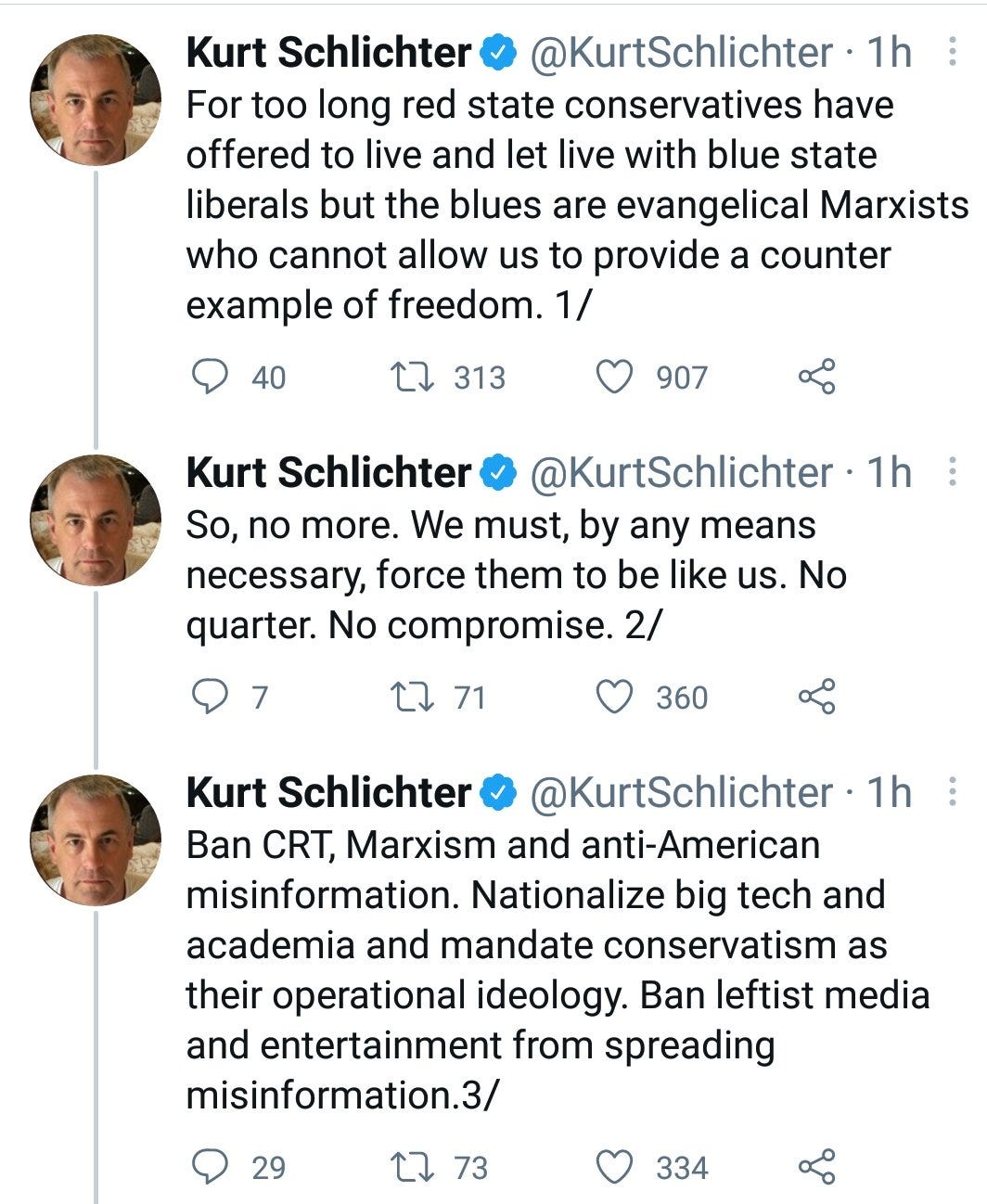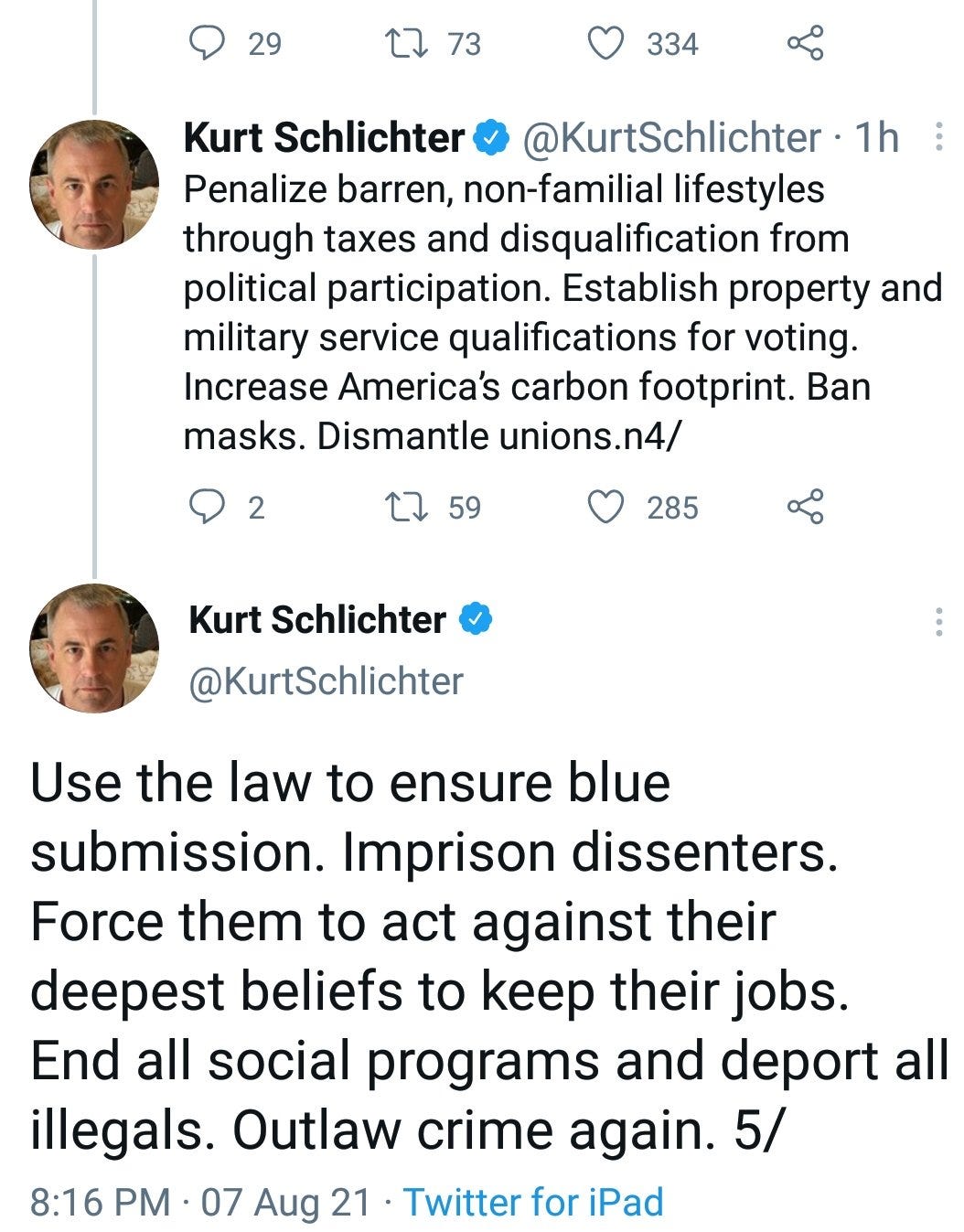“I love America, I think my country is the best in the world. But don’t tell me America is more free than Hungary.”
“Who’s freer? If you’re an American, the answer is painful to admit.” — Tucker Carlson
“War is peace. Freedom is slavery. Ignorance is strength.” ― George Orwell, 1984
**
In Tucker’s Brave New World, we are supposed to regard Europe’s most authoritarian regime as somehow “freer” than we are. It’s a bold play, even for the Fox News host, who is no stranger to inverted political morality.
With his visit to Budapest — and lavish praise for fascist-adjacent strongman Viktor Orban — Carlson is moving the Right’s Overton Window by explicitly embracing post-democratic illiberalism. His new version of “conservatism” also requires a dramatic revision of our idea of “freedom.”
After all, what is Tucker actually talking about?
Is he arguing that Hungary’s rigged elections are more free than ours? Or that the Orban-dominated media has greater freedom of the press? Is Hungary more free because Orban has shredded the country’s democratic institutions and now rules by decree?
When Tucker says Hungary is more free than we are, is he talking about the new ban of depictions of homosexuality, or Orban’s evisceration of academic freedom in the country’s universities? (Surely, he’s not talking about the freedom to keep and bear arms, since Hungary’s gun laws are far tougher than ours?)
Or is it just possible that Tucker’s Orban-fandom has nothing to do with freedom at all? Greg Sargent describes Carlson’s fawning interview with the authoritarian leader:
The interview’s central feature is Carlson gushing over Orban’s virulently anti-immigrant policies and demagoguery. Orban describes these as urgent to defending national identity, defined as his country’s “population” and “culture” and “language” and “tradition” and “land,” a right of defense dictated by “God” and “nature.”
Orban also castigates liberal internationalist Western leaders for wanting to intermingle “Muslim” and “Christian” communities, describing the latter as “original inhabitants.” Orban declares that his country decided “not to take that risk.”
Throughout, Carlson treats this vision of national identity as fundamental to Hungary’s success. He even suggests that in Hungary, people are freer than in the United States.
Not really a lot about freedom there. Nor were there many questions about Orban’s ongoing assault on democratic norms.
“Hungary is not a democracy anymore,” Zsuzsanna Szelényi, a former Hungarian member from Prime Minister Viktor Orbán’s party, said back in 2018. “The parliament is a decoration for a one-party state.”
Since then, it’s gotten worse.
Orbán and his allies gerrymandered parliamentary districts and packed the Constitutional Court. They seized control over the national elections agency, the civil service, and over 90 percent of all media in Hungary. They used economic regulation to enrich themselves and punish their opponents — persecuting a major university, for example, until it was forced to leave the country altogether.
Zack Beauchamp has called Orbanism, “soft fascism” because it is a system “that aims to stamp out dissent and seize control of every major aspect of a country’s political and social life, without needing to resort to ‘hard’ measures like banning elections and building up a police state.”
Is this what Tucker means when he talks about Hungary’s superior climate of freedom? Or did he mean Orban’s latest power grab?
[In March] Hungary’s parliament passed a controversial bill that gave Orban sweeping emergency powers for an indefinite period of time. Existing laws can be suspended and the prime minister is now entitled to rule by decree. Opposition lawmakers had tried to set a time limit on the legislation but failed. Orban’s commanding two-thirds parliamentary majority made his new powers a fait accompli.
Nor did Tucker explain how Hungary’s media was more free than their American counterparts.
Newspapers and other media outlets formerly critical of the government have either closed—like the left-leaning Népszabadság—or been taken over by investors close to the Orbán regime. State-run television channels “whitewash” the news in a way that favors the government.
Perhaps Tucker was referring to the atmosphere on college campuses. American higher education does have a problem with illiberalism and intolerant political correctness. But it seems more than a little perverse to hold up Hungary’s universities as a better, freer, model.


Indeed, in 2018, Orban’s regime effectively forced Budapest’s Central European University (CEU), to leave the country and relocate in Vienna, “bowing to nearly two years of pressure from the Hungarian government.”
“The government has never even tried to pretend that there were academic grounds for their actions,” the university wrote in a press release. “Arbitrary eviction of a reputable university is a flagrant violation of academic freedom. It is a dark day for Europe and a dark day for Hungary.”
Since then, Orban’s attack on higher education has escalated. In 2018, he banned gender studies from the country’s colleges. This year he dispensed with any pretense that the universities were independent. In March, the New York Times reported:
Hungary’s Parliament voted on Tuesday to transfer control of 11 state universities, along with billions of euros in related state assets, to quasi-public foundations led by close allies of the country’s prime minister, Viktor Orban.
Critics immediately denounced the move as a government handover of both public education and a vast network of public assets — including real estate and shares in Hungarian companies — to Mr. Orban and his supporters.
Ironically, given Tucker’s fervid support for the Second Amendment (which, of course, does not exist in Hungary), he also apparently did not include the right to bear arms in his discussion of freedom. As it turns out Hungary is run by what Fox News would describe as “gun grabbers.”
The regulation is very strict, and even though a lot of firearms disappeared after the change of the regime in 1990, Hungary is regarded as one of the least polluted countries regarding guns. Furthermore, the trend is that the authorities withdraw the arms licenses of almost everybody, even of members of the police or the military.
But these were mere details, and they didn’t matter to Carlson. What did matter? The good thing about Orban, Carlson explained at a dinner party, was that “you’re truly hated by all the right people.”
As Anne Applebaum noted, “all the right people,” includes “everyone who still has some faith in the American dream.”
“But Carlson’s cynicism about America is so profound, and his nihilism is so overpowering, that he doesn’t care.” she wrote. “If he can make people angry, he achieves his most important goal.”
**
In yesterday’s NYT, Ross Douthat offers a tortured explanation of the appeal of Hungary’s illiberalism to the American Right. It’s largely a rehash of the usual (often justified) complaints about American cancel culture and wokeness.
For a much rawer version of the right’s new Fascist Temptation, check out this thread from Kurt Schlichter. It’s worth noting that he is Hugh Hewitt’s backup radio host, a contributor to Townhall, and a featured guest on Fox News.
As I suggested yesterday on Twitter, I suspect that even Mussolini would read this and say: “Whoa, dude, you’re way over the top here.”
Bonus: Kurt’s loathing for the actual America isn’t a new thing.
Quick Hits
1. COVID Compassion Fatigue
Amanda Carpenter in this morning’s Bulwark:
Choices have consequences. And if a third of the country won’t get vaccinated, then the rest of us are left with our own set of choices. Do we want vaccine passports, workplace vaccine mandates, and masking requirements for fully grown adults—or kids on ventilators? (Warning: the last link is traumatic, albeit not nearly as traumatic for the boy, or his family who suffered through such torment.)
The good news is that the CDC has reported that 70 percent of American adults have received at least one dose of vaccine. That means, even in this incredibly politicized medical environment, an overwhelming majority of Americans are in favor of vaccines.
The bad news is that it’s wasn’t enough in time to stop the Delta variant.
So who should we have compassion for? The people who wind up in the ER after refusing to get vaccinated? Or the healthcare workers working around the clock to save their lives? For the hurt feelings of the anti-vaxxers who feel looked down upon? Or the children being hospitalized because a preventable pandemic is raging out of control again?
In a perfect world, we’d feel compassion for all of them. Every life is precious. But it’s been a long 18 months with a lot of tragedy and we’re only human. We’re at the point—passed it, really—where compassion is becoming a finite resource.
2. Even Without Conviction, Impeachment Will Remove Cuomo from Office
Kim Wehle writes in today’s Bulwark:
In all likelihood, there will be political fallout for Cuomo long before there are any legal repercussions. The New York State Assembly began an impeachment investigation in March and recently signaled it is nearing closure. New York law provides that if Cuomo is impeached (i.e., charged) by a majority of the 150-member assembly, he will lose his seat as governor pending a trial in the state senate. Only if he is acquitted will he be reinstated. Thus, unlike under the federal Constitution, which triggers no accountability unless there is a conviction and decision to remove a president in the U.S. Senate, Cuomo could be temporarily displaced from the governorship by a 76-person vote in the assembly. This could happen soon.
3. Democratic leaders are increasingly at odds with their own voters
Josh Kraushaar in the National Journal:
Democrats are a Shontel Brown party stuck in a Cori Bush world.
That’s the conclusion to be drawn from a week in which a pragmatic Democratic candidate (Brown) achieved a come-from-behind primary victory against a left-wing Bernie Sanders acolyte (Nina Turner), all while Democratic leaders fell all over themselves to praise one of the party’s most extreme members (Bush) for her successful push to get the Biden administration to extend its pandemic moratorium on evictions.











